The Presbyterian Church (U.S.A.) holds fast to a representative form of government where ruling elders and teaching elders are elected to ordered ministry and share in ecclesial authority as, together, we seek to discern and represent the will of Christ in and through faithful service. To this end, “congregations should elect persons of wisdom and maturity of faith, having demonstrated skills in leadership and being compassionate in spirit” (Book of Order, G-2.0301).
Once a new class of ruling elders is elected by a congregation, the session is called upon to prepare these new leaders for service in the church. The responsibility for this time of study and preparation is sometimes delegated to a staff member, such as the pastor. But it is a responsibility of the session, acting as a whole, to prepare newly elected ruling elders for active participation in the leadership of the church. This training may include a review of:
- Biblical highlights of strong, courageous leaders (consider: Moses, David, Esther, Paul, Peter, etc.);
- Presbyterian polity and doctrine, including “The Marks of the Church” (F-1.0302), the “Notes of the Reformed Church” (F-1.0303), The Great Ends of the Church (F-1.0304), and the constitutional questions asked of ruling elders at their Installation (W-4.4003);
- An inventory of spiritual gifts and talents;
- The duties and procedures of ministry, both in general and within a given context;
- The intersection of life and faith, as it pertains to church leadership.
After a time of study is completed, it is expected that the session will examine new leaders as to their readiness for service (G-2.0402). This examination is not intended to be harsh or punitive, but to serve instead as a mutual discussion about the church, its mission, and leadership. All this is done in a spirit of peace and for the sake of a nurtured and healthy community of faith. “Teaching elders shall be committed in all their work to equipping the people of God for their ministry and witness” (F-3.0202). This examination might include questions about the candidate’s:
- Personal faith and spiritual maturity;
- Commitment to Christ and the Church;
- Willingness to serve;
- Openness to the guidance of the Holy Spirit in becoming “a community of faith, hope, love, and witness” (G-3.0201);
- Desire to work for peace in the face of change, and to seek unity in the midst of diversity;
- Knowledge of the Constitution of the church (doctrine, government, and discipline); and
- Understanding of the duties incumbent upon a ruling elder.
Along with teaching elders, ruling elders are called to be stewards of the faith and champions of the gospel. Those who are called will lead by example. So it best be a good example!
The Reverend Dr. Rhonda Myers is pastor of the Chapel Lane Presbyterian Church in Midland, Michigan, serves as chair of her presbytery's CPM, and is married to an intentional interim pastor, the Reverend David Myers, who is currently serving in Linden, Michigan.
For more about the information provided here, please contact Martha Miller at martha.miller@pcusa.org and browse the Ruling Elders website.

